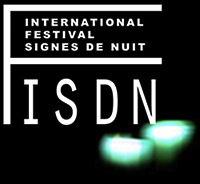 |
|
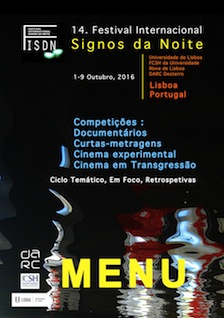 |
The 14th International Festival
Signes de Nuit
at Lisboa
October 1st - 9, 2016
|
|
|
|
|
|
|
|
|
****** |
|
AWARD CELEBRATION
The Awards of the Section Cinema in Trangression
Sunday, October 9, 2016
/ 7 pm
DARC Desterro
Lisbon / Portugal
|
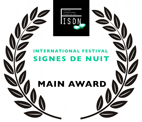 |
Main Award :
The Case of Former Psychiatric Hospital Ward Attendant
Nikolay Nasedkin
|
|
|
The Case of Former Psychiatric Hospital Ward Attendant
Nikolay
Nasedkin
Russia
2016 / 0:39:00
The film constitutes a kind of an "ego-document" created by the Russian artist Nikolai Nasedkin with the aim of reflecting on the "baggage" of his own creative background, packed in a plywood case of a former psychiatric hospital ward attendant.
|
|
Jury Statement :
|
|
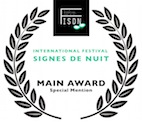 |
Special Mention :
for Main Award
Hypertelia
Jonathan Palomar |
|
|
Hypertelia
Jonathan Palomar
Canada, Columbia
2015 | 0:10:00
The ultimate mash-up: from Lumiere brothers to Spiderman, through Lili Marleen and Minecraft; a found footage and video essay on hyper-reality, technology, and humankind.
|
|
Jury Statement :
|
Director Statement :
Thank you very much for the honor. I wish I could be there, your
programe looks amazing. Thanks again!
|
|
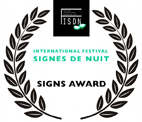 |
Signs Awards :
Black Code
Louis Henderson
|
| The Signs Award for Documentary honors films, which express in a
surprising way sensible and perturbing aspects of reality. |
|
|
Black code
Louis Henderson
France
2015 / 0:21:00
Louis Henderson analyses the lingering racial violence in the United States by drawing on the recent murders of Mike Brown and Kajieme Powell by the police. To try and chart its genealogy and describe its development, the director uses the notion of “code” and its polysemic dimension. Denoting both a legal decree and an algorithmic rule, the code is seen as underpinning necropolitical power. Henderson’s discourse hinges on the articulation, embedding and superposition of disparate images and sounds taken from the Internet in order to propose a critical perspective of Afro-American history. The only moment of hope is the repetition of the beginning of Humberto Solás’ Simparele (1974), where singer Martha Jean-Claude calls on the pride and independence of the Haitian people…
|
|
|
Jury Statement :
|
Director Statement :
|
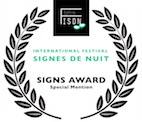 |
Special Mentions :
for Signes Award
Most of Us don't Live There
Laura Marie Wayne
Procedere
Delia Schiltknecht
|
|
|
Most of Us don't Live There
Laura Marie Wayne
Canada, Cuba
2015 | 0:25:00
Most of Us Don’t Live There is a memoir, both visually stunning and heartbreakingly sincere; a young woman wanders the landscapes of her childhood and explores a life coloured by bipolar depression. Set in the powerful Canadian Rockies, the film draws a link between nature and the human mind and calls for a re-visioning of what we understand as mental illness.
|
|
Jury Statement :
|
|
|
|
Procedere
Delia Schiltknecht
Switzerland
2015 | 0:06:00
The genuine disease diary leads into the soulscape of a person suffering from OCD: „Bad images should disappear suddenly!“ Since negative images mustn’t been thought. Nevertheless, they are here and constantly circling in the brain. The compulsive actions should dispel them... A vicious circle.
|
|
Jury Statement :
|
|
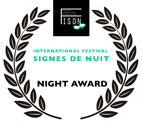 |
The Night Award
Final Gathering
Alain Escalle |
| The Night Award for Documentary honors films, which represent reality
in an ambivalent and enigmatic way, avoiding stereotypes of
representation and simple conclusions. |
|
|
Final Gathering
Alain Escalle
France
2016 / 0:13:00
Final gathering
Alain Escalle
Subjective experimentations affecting the reality of a memory, leaving the auditory and optical traces in an "in-between" world in mutation.
|
|
Jury Statement :
|
Director Statement :
|
 |
Special Mentions :
for Night Award
Psaume
Nicolas Boone
Scorched Water
Alexander Hick |
|
|
Psaume
Nicolas Boone
France
2015 / 0:48:00
In a near future, the villages of a Sub-Saharan area have all been deserted. Mad and disable people as well as child soldiers are the only ones who remain on those dry lands. In this survival atmosphere, relationships are harsh.
|
|
Jury Statement :
|
|
|
|
Scorched Water
Alexander Hick
Germany, Ecuador
2015 / 1:16:00
In order to escape being sacrificed, the God Xólotl transforms himself into a salamander, fleeing from what he once was." So relates the voice in the essay film which tells of the search for the Axolotl, a salamander that lives in the lakes surrounding Mexico City. The Axolotl refuses to undergo metamorphosis. According to a fishermen who survives on the outskirts of the megalopolis, the animal now disappeared. Cognizant of the mythological immortality that surrounds the strange creature, he expresses the desire to transform into one himself. Taking up this mythology of transformation from god to animal as a metaphor for Mexico City itself, the director accompanies a corrupt policeman and brutal gang members in the sprawling suburbs of the megalopolis. He examines the struggle for survival in what was the former lake of Mexico but is today the habitat of 23 million people. As an essayistic inquiry into survival and adaptation, the film casts its gaze on that which remains.
|
|
Jury Statement :
|
|
 |
Edward Snowden Award
The Great Wall
Tadhg O'Sullivan
|
| The Edward Snowden Award honors films, which offer sensible (mostly) unknown informations, facts and phenomenons of eminent importance, for which the festival wishes a wide proliferation in the future. |
|
|
The Great Wall
Tadhg O'Sullivan
Ireland
2015 / 1:14:00
‘The Great Wall has been completed at its most southerly point.’ So begins Kafka’s short story ‘At the Building of the Great Wall of China’, and so, at Europe’s heavily militarised south-eastern frontier, begins this film. In the shadow of its own narratives of freedom, Europe has been quietly building its own great wall. Like its famous Chinese precursor, this wall has been piecemeal in construction, diverse in form and dubious in utility. Graduallycohering across the continent, this system of enclosure and exclusion is urged upon a populace seemingly willing to accept its necessity and to contribute to its building. From Europe’s edges, The Great Wall moves across various unidentified fortified landscapes, pausing with those whose lives are framed by borders and walls. Moving inward toward the seat of power, the film holds the European project up to a dazzling cinematic light, refracted through Kafka’s mysterious text; ultimately questioning the nature of power, within Europe and beyond.
|
|
Jury Statement :
|
|
|